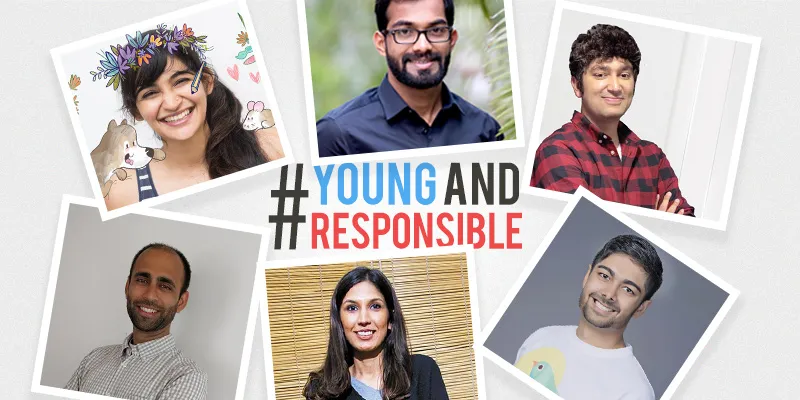Think the younger generation is reckless? These 5 budding entrepreneurs are proving otherwise
This story is brought to you by HDFC Life.
If you’ve ever been on a road trip with people from different age groups, you’re probably aware of what generation gap means. Someone will want to listen to classic rock bands, another wants only Bollywood tracks, and then there are those kids who won’t be satisfied till there’s house music blaring on the stereo.
This is just one instance. Generation gap transcends beyond music. A look at what it take to make people happy in today’s society shows just how differently each generation thinks. While the older generation is working towards being happy with stability and the roti, kapda aur makaan model, the younger generation looks beyond materialistic success - they want to find the joy in life by pursuing their dreams.
This gap often leads to friction, criticism and misunderstandings. Youngsters are often chided for their ‘recklessness and irresponsible behaviour’ by the older generation. But here are some successful under-30 entrepreneurs who are defying this stereotype.

1. Ashwath Hegde
Despite the restrictions on their usage, plastic carry bags are still around due to the lack of cost-effective alternatives. These bags pose a huge environmental risk because polymers take at least 500 years to decompose.
But 24-year old NRI Ashwath Hegde’s Envigreen Biotech is slowly changing things. Currently in seven countries, the startup creates plastic-free bags made from vegetable waste and oil derivatives. Launched in 2016, the bags decompose naturally in 60-180 days. But it wasn’t easy to start off in the first place. Hegde explains why: “The idea to start this happened when Mangalore banned plastic bags in 2012. My uncles and I differed on this, as there was too much commitment involved in starting the venture. However, once they realised that I am capable of doing this they encouraged me.”
Hegde personally funded the team of researchers that developed the biodegradable bags, which was possible with some judicious investment and financial planning on his part. He adds, “Money management plays an important role in every entrepreneurial journey. Our aim is to reduce costs and make these bags available to everyone at a reasonable price. And for that, financial planning becomes crucial.”
This chirpy 28-year old illustrator is known for her quirky art productions. The brand, Alicia Souza, an eponymous product chain, is a very popular online business. But it wasn’t as easy and fun as she makes it look. After her successful run with Chumbak, Alicia had to struggle as a freelancer, before finally turning her talent into a full-fledged business.
She says, “I know that my folks and older family members were concerned when I started on my path, and I cannot be more grateful for them for just letting me be. That is something I hope to give to my future generation. Plus, I was taught early in life that saving is important. I’ve always kept a percentage of my income or directly invested it. Having savings has gotten me through many rough spots - I could make that financial investment when needed.”
For Alicia, building a brand has been quite the journey. “It has come to a point where it gets challenging every day. But we are going to face it all, foray into the retail world, grow our online space and just be happier,” she says with excitement.

In 2012, when Suchita was in Delhi, she found herself looking for new things to do. Her frustration lead to the start of the Little Black Book (LBB), a local discovery platform that offers recommendations and for food, events and other cultural dos across the country.
Her 29-year old co-founder Dhruv Mathur looks after the technology side of the business, while she focuses on the content production. Says Suchita, all of 26, “We have had to work very hard to prove ourselves and get a seat on the table. I think it's important to define the consumption choices that make you happy. I've grown up seeing both my parents work their way up - as a doctor and a lawyer - so I know what hard work looks like, and that every penny counts. ”
LBB is currently available in six Indian cities and recently placed themselves in Singapore too. They believe that they are just getting started. Dhruv adds, “The road ahead will see us growing our run rate and user base by 300 percent in the next year, and expanding our footprint to include the Indian and international market.”
Having almost dropped out of college to start GuestHouser, Dhruv Sharma is familiar with the ‘you are being young and reckless’ accusation. The 25-year old says, “At the time, it was difficult to explain to my parents how little a degree mattered to me. We finally agreed that it would be better to stay since I was just two semesters away from graduating Summa Cum Laude, Boston University's highest honours."
Founded in 2014, this Gurugram-based startup gives people with properties a chance to monetise them and gives travellers an option to experience the culture and traditions of the place they’re visiting. When it comes to investing right, Sharma is very particular. He explains, “I have not found the time to make any meaningful or substantial personal investments outside of GuestHouser, but I do look forward to making some in the next three to five years. However, I believe in making thoroughly researched and educated investments, as there can be a significant downside to bad investment decisions as well.”
Thinking of doing something quirky and unique and impactful in the digital space, Chintan joined his business partner and friend, Anuj Gosalia, and became co-founder of Terribly Tiny Tales (TTT) – an online micro-fiction platform that is redefining storytelling and catering to the internet’s short attention span. TTT that initially started with stories written within 140 characters with a penny drop moment, has recently ventured into making powerful short films as well. They also have their own app, along with workshops and community outreach.
Today, the organisation stands as the world’s most celebrated micro content platform. Chintan explained that it wasn’t easy coming this far. The audience seemed receptive, but his parents were a little converned. The 29-year old says, “Initially, my dad was very skeptical about what I was doing but the fact that I was investing was a good argument to say now you can go and explore new things”.

He adds, “It’s tough to sustain yourself financially when you take a startup plunge. But with passion for storytelling, taking good content to our audiences and the right planning, TTT has come a long way from the start. With time, my folks bought into our vision and our effort is to now keep on moving forward.”
It has been four years to the TTT journey. Yes, the constant lack of support from the older generation, and no money can be enough to put off plenty of dreams. But these youngsters went off the script and rewrote their life’s stories to follow their heart. They are running their businesses successfully and are familiar with every aspect that goes into it.
It’s true that not everyone knows how to go about it, but companies such as HDFC Life offer insurance solutions that help you achieve your financial goals. They believe in your dreams and also in the fact that all it takes is a little extra effort to make people see things your way, be it from any generation. This is why they brought together the #YoungandResponsible to talk about their journey. Watch the video to find out how it went.
So if you’re passionate about something, don’t let anything stop you. It’s more than just about being your own boss - it’s about taking risks and learning everything there is to achieve your dream. A little bit of planning will take you and your ideas a long way, and help you live the kind of life you want to; and HDFC Life’s savings and investments plans are here to help.







